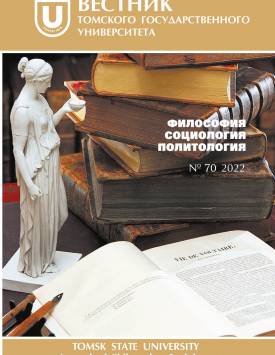Youth in search of their political party
In the 2010s-2020s, we can observe a contradiction in Russia: on the one hand, sociologists record the depoliticization of youth; on the other hand, young people are increasingly becoming subjects of the political underground. This alarming trend, called alienation, is a consequence of a lack of a dialogue between youth and parties, which results in a social divide and frustration among young people. In this article, based on the materials of a qualitative sociological study conducted in August-November 2021 on 31 focus groups in 13 subjects of the Russian Federation covering 300 people aged 18 to 25, we elaborate on these issues. According to the results of the study, most of young people identify themselves as liberals, socialists, and conservatives. The groups of both liberals and socialists were dominated by tolerant positions on all acute political issues, which brought them closer together. In contrast, the patriarchal conservatives rejected tolerance and favored traditional values. Instead of a right-/left-wing continuum, we found that attitudes toward minorities are becoming a prevalent split factor among young people and the old ideological scheme is losing its relevance. It would be logical to assume that young people, having decided on their ideological positions, give preference to the corresponding party or leader. However, 90% of young people surveyed said that there are no parties in Russia today that express their interests. A discrepancy arises between the demand of the generation of 20-year-olds and the presented range of Russian politic structures. Today, due to the Internet, young people are genuinely becoming interested in public affairs. In parallel, there is the old world of “youth policy” which was invented by adults for the young. Among the zoomer generation there is a sense of disbelief in the old-style political system. Parliament seems to them a relic of the past when direct democracy was impossible. Zoomers today see how effective social media are: millions of people speak out every day on current issues, they no longer need “representatives” to be heard. Young people are not against the creation of a party capable of expressing their interests, but, in general, another party within the framework of the old idea of representative democracy does not arouse their enthusiasm. They are looking for another opportunity to express an active position, and so far they have not found it. To understand the young is sometimes the shortest way to avoid problems in the future.
Keywords
youth, political parties, generations, leadersAuthors
| Name | Organization | |
| Kryshtanovskaya Olga V. | Russian State University for the Humanities | olgakrysht@yandex.ru |
| Lavrov Ivan A. | Russian State University for the Humanities | lavrov.sociology@gmail.com |
References

Youth in search of their political party | Tomsk State University Journal of Philosophy, Sociology and Political Science. 2022. № 70. DOI: 10.17223/1998863X/70/22
